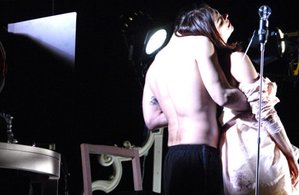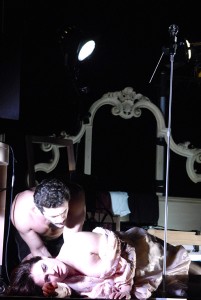
Leggi questo articolo in italiano
Thanks to Antonio Latella and to his wonderful company, for once the Teatro Argentina in Rome turns into a proper European theatre, a brave stage able to squeeze a great evergreen play and spill that fundamental juice to refresh the audience.
Working hard between Italy and Germany, Latella chooses Tennessee Williams’ A Streetcar Named Desire, one of the most challenging classics: on the memory of any spectator, a bunch of images and references reverberate. Marlon Brando‘s performance, Elia Kazan’s movie, the whole myth of Strasberg’s Actors’ Studio and untouchables Italian versions such as Luchino Visconti‘s starring Marcello Mastroianni: apparently everything stays there, watching over new attempts. To free himself from such masterpieces, Latella purifies his work from any classic approach to scenery, light design and narrative material.
On Blanche’s line «I don’t want realism» Latella bases a starting point, a declaration of intent extraordinarily strong if brought to extreme consequences on behalf of the representation of feelings and actions.
On the stage appears a strange symbiosis connection between minimal furnishing and technology, with floodlights and loudspeakers sprouting out in every corner like obstinate weed. On a round table a wide searchlight is pointed by actors on actors (and also, disturbingly, on the audience); a strobe sizzles from inside a fridge; a neon burns under a bed on the right side, on the left the role of the bathtub is played by a bubble machine; a lonely door on the background. On this luminous and sonorous stage, every piece of furniture is made of bright wood and caught naked in his basic frame.

So full of piled up elements, the scene offers narrow space to actors’ movements, which creates a sort of discrepancy in the perception, a perspective distortion. Yet the most significant intervention and value are evident in the adaptation and in the dramatugical analysis. The character of the doctor, which appears only in the last pages of the text, is here invested with the great responsibility of a prologue. The doctor will follow the whole staging becoming a sort of collective consciousness halfway between a psychiatrist – he inhabits a right-sided angle furnished with emblematic leather-couch and lampshade – and a deus ex machina. Rosario Tedesco tells the play reading the stage directions, stays in the right forestage next to Blanche, he’s her guardian angel but also the one who orders her to stop and to take pauses into the lines, playing in a very subtle metatheatrical game.
We were well aware of the stellar level of Latella’s actors, so it is not a surprise to see the aching madness of Blanche through a wonderful Laura Marinoni, who internalizes the tragedy staring into the distance while behind her rumbles and noises explode, strobes sizzle and electric guitars pump up the volume. Nor it’s a surprise the great Elisabetta Valgoi‘s Stella, whose pregnancy is a bunch of confetti flying out of a clearly fake belly. More indicative is the performance of Vinicio Marchioni (broadly famous as a tv star): a strong Polish accent-speaking Kowalski, his contention with Brando is immediately wiped away by parody: Brando’s face is printed on the three t-shirts wore by Marchioni. Indigestible and brutal is his character, all played headlong on rage and disgust.
Everything orbits around Blanche and the audience looks and lives an experiential “point of view shot” in which the characters act right across the border of an extreme imagery. The effect is disturbing and offers no escape to identification, the lights are pretty much always on, filling the gap between stage and stalls. During the intermission I listen to comments such as: “They keep on ‘searching’, then what will we be left to search about?”; “This year went even too good so far, we were bound to be swindled someday”; “I much prefer classic stagings, not this modern stuff”; “I can’t follow it… all those lights, those noises, I don’t get it, I really don’t”…
Everybody talks but few of them leaves. An electric shock hit an exposed nerve.
Andrea Pocosgnich
[translated by Sergio Lo Gatto]












